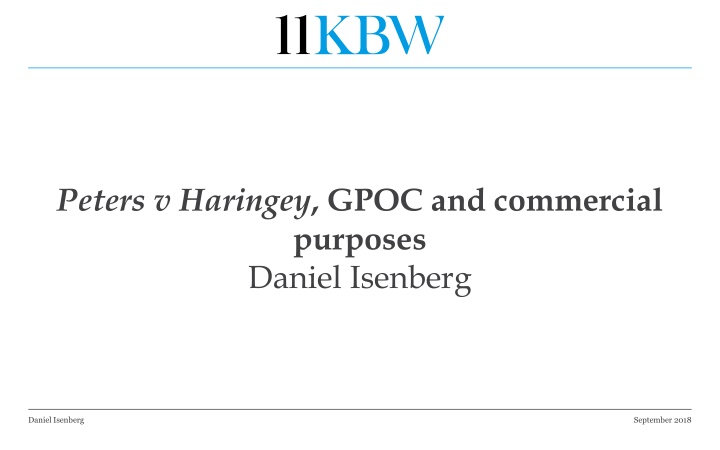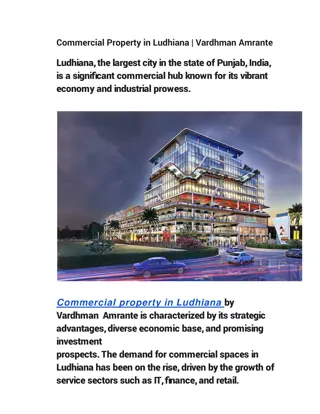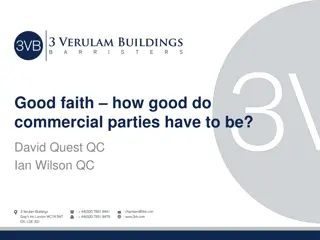Legal Aspects of Acting for Commercial Purposes
Explore the legal complexities surrounding acting for commercial purposes, including challenges, outcomes, and considerations in decision-making. Understand the implications of local authorities operating through companies and the pros and cons of different corporate structures.
Download Presentation

Please find below an Image/Link to download the presentation.
The content on the website is provided AS IS for your information and personal use only. It may not be sold, licensed, or shared on other websites without obtaining consent from the author.If you encounter any issues during the download, it is possible that the publisher has removed the file from their server.
You are allowed to download the files provided on this website for personal or commercial use, subject to the condition that they are used lawfully. All files are the property of their respective owners.
The content on the website is provided AS IS for your information and personal use only. It may not be sold, licensed, or shared on other websites without obtaining consent from the author.
E N D
Presentation Transcript
Peters v Haringey, GPOC and commercial purposes Daniel Isenberg Daniel Isenberg September 2018
R (Peters) v Haringey LBC [2018] EWHC 192 (Admin) Claimant - a Haringey resident and Stop HDV member; Defendant - Haringey LBC; Interested party - Lendlease Europe Holdings Ltd Claim issued 14 August 2017; rolled-up hearing 25-26 October 2017; judgment 8 February 2018 Permission refused on all grounds application for permission to appeal
The grounds of challenge and outcome (1) Decision to participate in LLP ultra vires Failed on merits, and for delay (2) Breach of consultation duty under LGA 1999 - section 3(2) Failed for delay (3) Breach of public sector equality duty Failed on merits, and for delay (4) Decision should have been taken by full council, not executive Failed on merits
Acting for a commercial purpose General power of competence (Localism Act 2011 section 1) Very broad (almost unlimited, subject to pre- and post- commencement limitations, and rules on charging for performance of statutory duties) But section 4(2) says: Where, in the exercise of the general power, a local authority does things for a commercial purpose, [it] must do them through a company.
Pros and cons of companies Sometimes an LA will be happy to act through a company But may prefer to exercise powers directly, potentially for reasons of presentation, control/governance, or resourcing LA and/or partner may prefer a corporate structure that is not a company typically, an LLP so that profits are passed through to partners to be taxed in accordance with tax regime applicable to them
Common issues in practice Plain vanilla case: LA establishes a trading venture solely to make money for general use by dealing at a profit obviously a commercial purpose But what if position is more complex? e.g. Activity will/may generate profit, but also socially useful (e.g. job creation, regeneration, services to meet need not met by market) Profit may be desired, but may also be a chance by-product (or even forced on authority by prudence, or need to avoid state aid) Intention may be to recycle profits in same activity, rather than take for other purposes Terms of business essentially commercial, but charges currently set at loss-leading or breakeven level
What was the GPOC issue in Peters? Clear on facts that: LLP would itself do business with view to profit (statutorily required for establishment as LLP) Lendlease as commercial company was engaged in the exercise to make money Material profit from development/exploitation of properties was expected, and council was welcoming of that But also clear that Council saw HDV as best/only means to use its land to achieve regeneration, job creation and new-build housing Council believed it needed to attract private sector investment and expertise to combine with its own land assets Claimant conceded that unable to show on facts that money-making was dominant purpose for the council
What did Ouseley J hold? Not acting for commercial purpose, so entitled to act through LLP Relevant purpose was that of council, not that of LLP self, nor that of other partner in LLP Mere (intended) profit-making did not demonstrate commercial purpose If there were separate purposes in play, only caught by company requirement if dominant purpose was commercial On facts, council s single/overall purpose was non-commercial in effect, regeneration rather than property development - any commercial component merely ancillary (and certainly not dominant)
Implications (1) By necessary implication, as well as his endorsement of Warren J obiter in R (The Durham Co Ltd) v HMRC [2017] STC 264, Ouseley J accepts that purpose turns on authority s motive, rather than on objective nature of what it does Authorities will therefore need to be clear about their thinking when proposing to rely on GPOC for broadly money-making activities Ouseley J must also agree with Warren J that if purpose of the essential transaction is non-commercial, it does not matter that it is structured in a particular way for reasons of financial advantage
Implications (2) Net effect is that only cases that are in or close to the plain vanilla trading category will have to be pursued through a company Might even such cases escape the net if profits were earmarked for a particular social purpose? may prove too much, given the legislative intention Overall rather than atomised approach to what authority is doing makes analysis simpler but makes it less likely that GPOC can be used, without a company, for gap plugging aspects of commercial transactions relying mainly on other powers
Other powers? the argument Council relied in alternative on cocktail of other powers: LGA 2003 section 12 (investment) for purposes of housing/economic development functions LG (Contracts) Act 1997 section 1 (contract entry) LGA 1972 sections 111 (general incidental), 123 (land disposal) Local Authorities (Land) Act 1963
Other powers? the judgment Ouseley J was sceptical that these provisions could be relied upon if (contrary to his view) Council was acting for a commercial purpose But this must be seen as part and parcel of his approach to what commercial purpose means, i.e. that it applies where authority s sole or dominant objective is to make money this would fall outside at any rate s 111 also seems that Ouseley J saw some limits to concept of investment If commercial purpose was more widely interpreted, other side of coin would be that such powers might apply in such cases s 4(2) restriction only applies where GPOC is the power being used
Consultation obligations Local Government Act 1999 s 3 (1) A best value authority must make arrangements to secure continuous improvement in the way in which its functions are exercised . . . (2) For the purpose of deciding how to fulfil [that] duty, an authority must consult . . . [persons who appear to the authority to be representative of [the following groups]: (a) [local taxpayers] (b) [local ratepayers] (c) [service users] (d) persons appearing to the authority to have an interest in any area within which the authority carries out functions.
The three great section 3 mysteries When does the consultation obligation apply? What is the fourth [sub-para (d)] consultee group aimed at? Why do almost no authorities appear to take any notice of this duty? Lack of assistance from the statutory guidance
Section 3 caselaw Section 3 considered in relative detail - By Underhill LJ at first instance in R (Nash) v Barnet LBC [2013] EWHC 1067 (Admin) challenge to large-scale outsourcing project By Ouseley J in Peters In both cases, duty was breached but challenge failed on delay grounds (though no difference argument rejected in Peters) CA in Nash really only engaged with delay issue, but did not disapprove Underhill LJ analysis of substance
What we know from Nash and Peters Despite obscure s 3 wording, duty to consult extends to substance of decisions about how to perform functions (not just about how to make arrangements for improving performance) Duty relates to high-level decisions about arrangements with other parties, not Implementation of decisions Particular operational decisions Matters of improved internal efficiency (Ouseley J) Outsourcing is paradigm case, but not only example
Practical thoughts for authorities The line as to what section 3(2) does and does not catch remains very hard to draw a broader approach will in practice be prudent This is not an obligation of public consultation representative arrangements will do
Timing Consultation needs to precede the taking of the high-level decisions Cuts both ways Last minute attempts to derail major projects should normally come too late But harder for authorities to repair omissions later























